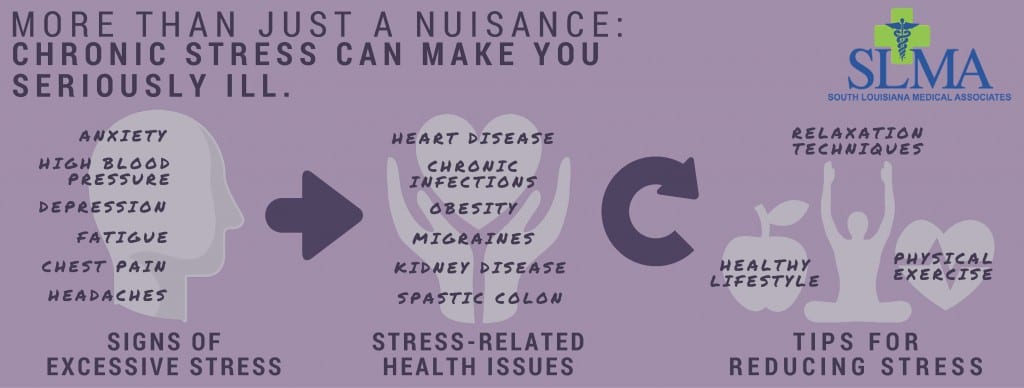Stress is a condition that occurs when certain circumstances or situations put you in a state of emotional or mental distress. Many people become stressed over marriage problems, issues at their jobs or problems with their children, but a wide variety of different experiences can cause a person to feel severely stressed. This condition is much more than a mere nuisance because severe and chronic stress can lead to several medical problems and conditions.
Signs of Excessive Stress
Everyone experiences some level of stress, but those who live with chronic stress may find themselves afflicted with several negative physical and emotional effects from this condition.
• Depression
• High blood pressure
• Headaches
• Digestive difficulties
• Inability to focus
• Anxiety
• Lack of energy
• Weight problems
• Addiction concerns
• Fatigue
• Anger issues
• Social withdrawal
• Chest pain
• Muscle tension or pain
• Rapid heartbeat
Stress-Related Health Issues
Each of the above effects on their own may not seem like too much to worry about, but the combined effects of chronic stress have the ability to compromise your immune system, keep your blood pressure at dangerous levels and leave you vulnerable to an unpleasant variety of health issues. Stress is not to be taken lightly because some of these health concerns can even prove to be deadly if not addressed promptly.
• Heart disease
• Heart attack
• Kidney disease
• Various cancers
• Migraines
• Obesity
• Diabetes
• Spastic colon
• Chronic infections
Tips for Reducing Stress
While stress is a part of life, it’s important that you take hold of the problem before it can cause you any serious health problems. Whenever possible, you should take steps to remove yourself from any situation that causes you to feel stress on a regular basis. If the stress occurs due to a job or a relationship, then you’ll find that moving on may be the best key to removing that stress from your life. There are several other things that you can do that should help alleviate your feelings of stress.
• Physical Exercise: Get your body moving at least an hour each day, and you’ll find that this is a great reliever of stress. Try to pick something that you really enjoy such as walking or running with your dog, taking a dance class or swimming with a few water aerobics thrown in.
• Utilize Good Relaxation Techniques: Find the thing that works to calm you down. It can be as simple as listening to music or taking a bubble bath by candlelight. You may also consider a good massage, meditation or yoga.
• Choose a Healthy Lifestyle: Eat well, stay hydrated, enjoy good friends and great hobbies and avoid the use of tobacco or alcohol. Limiting sweets and caffeine will also help your levels of stress, and don’t forget to schedule a yearly checkup with your primary-care physician.


